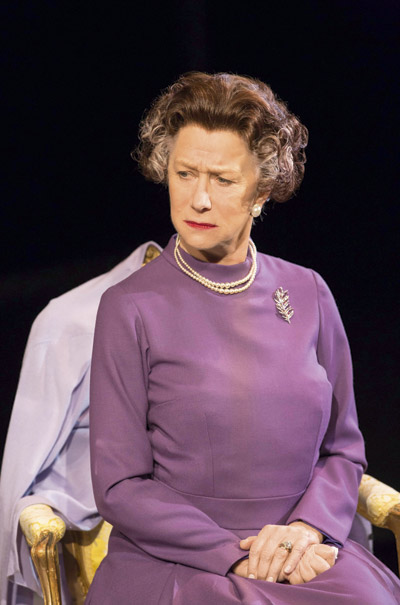Peter Morgan has extracted more cash from the royal ‘brand’ than the Buckingham Palace giftshop. He’s at it again with The Audience, a fictional dramatisation of the weekly conversations between the Queen and her first ministers. This is a smart idea carried off with intelligence and plenty of style. Morgan dispenses with a linear parade of PMs and leaps to and fro across the decades. A youthful Harold Wilson bustles in full of self-confidence and jokes. The Queen takes to him immediately. Barely ten years later, the Yorkshireman has dwindled into a broken figure and his legendary memory is fading fast. But as he shrinks, the bond of affection between himself and the monarch grows. It’s one of the play’s few attempts at emotional depth.
Elsewhere, Morgan prefers to lay on crowd-pleasing gags, at the cost of authenticity. It’s hard to believe that Her Majesty would tittle-tattle about the Blairs arriving at Balmoral in ‘spanking new tweeds’, with the price tags still attached. Haydn Gwynne, as a coldly sinuous Mrs Thatcher, rages a little too stridently about political leaks that suggest royal disapproval of her social reforms. Nathaniel Parker gives us the comic-book Gordon Brown, fidgeting and picking obsessively at the rind of his fingernails. It’s hardly subtle but it strikes a tremendous chord. The excellent Michael Elwyn offers an unexpected snapshot of a distracted, pill-popping Anthony Eden. And Paul Ritter’s cringing, self-pitying John Major breaks into tears as he confesses his feeble tally of O-levels to the Queen. ‘What fine hands the country is in,’ she says tartly.
Helen Mirren’s assurance and tranquillity throw some light on the Queen’s inner resilience and on the loneliness of the monarch’s job. The on-stage costume changes remind us that she’s obliged to keep the act going even when, technically, she’s in her own sitting-room. A captivating performance from Mirren can’t entirely banish the suspicion that this is a glittering array of high-quality political sketches. It’s the Mike Yarwood show with Oscar-level talent. A great night out, certainly. A hit, undoubtedly. But a drama? Not quite.
More royal impersonations at the Tristan Bates. Jeremy Kingston’s comedy, Making Dickie Happy, is set in the 1920s on Burgh Island in south Devon where Noël Coward, Agatha Christie and Lord ‘Dickie’ Mountbatten are ensconced in the same hotel.
Elements of the story are true. Dickie suggested to Agatha Christie the final twist in The Murder of Roger Ackroyd where the storyteller turns out to be the killer. This snippet of documentary realism is the starting point for a vivid, intriguing portrait of upper-class homosexuality before the second world war. Kingston’s drama suggests that Dickie, and his friend the future Edward VIII, belonged to an international colony of in-the-closet gay men whom dynastic duty, rather than lust, propelled up the aisle on the arm of their heir-conditioned brides. Noël Coward existed at the fringes of this camp crew and his beguiling personality dominates the action. The snag with playing Coward is that every actor can ‘do’ Noël. Those clipped, flinty tones (developed in childhood to penetrate his mother’s dysfunctional hearing) are a staple of the backstage repertoire. So a full-scale impersonation of the Master is fraught with danger. Too much ‘Noël’ and it becomes tedious, grating and shallow. Too little and it cuts against your expectations.
A smart young actor called Phineas Pett (yes, that’s his real name) manages to avoid the pitfalls and to give a well-rounded and non-irritating portrait of the exuberant wag. He bears a handy resemblance to the real thing too. He gets Coward’s charm, his verbal inventiveness and his almost extra-terrestrial self-confidence. And he sprinkles the confection with magical touches of comedy. Nor does he stint on Coward’s blatant hostility towards women whom he regarded as sexual rivals. During an early conversation with Agatha Christie he advises her to ‘take a stroll along the cliff-edge in a high wind’. No hint of self-reproach tempers this lacerating putdown.
Kingston’s script has little narrative momentum or development. A deliberate choice. His witty, acerbic drawing-room chatter moves around in languid, naturalistic circles. This allows his expert portraiture to shine through, bright and sharp. Dickie is a particular triumph. A cold, anxious charmer, Dickie was obsessed with his royal pedigree. And he’d vowed to correct the injustice done to his father who, in 1914, had been dismissed as First Sea Lord for the crime of sporting a German surname. He was also terrified of marrying the sexually voracious Edwina. ‘Never mind the first-night reviews,’ drawls Coward unhelpfully, ‘she’ll expect a long run.’ This unsympathetic sketch of the paranoid Dickie is done with calculated flair by James Phelips. And Helen Duff brings shrewdness and a sexy inscrutability to Agatha Christie. She’s one to watch.







Comments